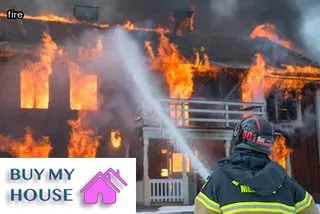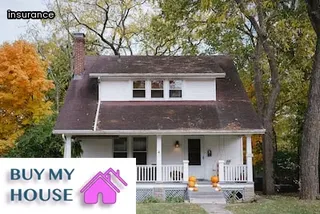Homeowners insurance is an important asset for anyone who owns a property, as it helps to protect against the financial burden of unexpected disasters such as house fires. While it is not an absolute guarantee against loss, it can provide a much-needed safety net in the event that damage does occur.
Homeowners insurance typically covers any structural repairs or replacements needed due to fire, theft, or other accidents. It can also cover some of the belongings inside the house, though this coverage varies from policy to policy.
Other coverage may include liability protection from lawsuits if someone is injured on the property, and living expenses in case you’re unable to stay in your home due to damage caused by the fire. Shopping around for different policies and comparing rates can help you find a suitable amount of coverage at an affordable price.
Additionally, certain types of mortgage loans may require homeowners insurance as part of their terms so it's important to understand what type of coverage you need before applying for a loan. Doing research into various policies will ensure that you are properly covered and protected in case disaster strikes.

Homeowners insurance plans come in a variety of coverage levels, and it is important to determine which level of coverage you need. The three main types are basic, broad, and special form.
Basic forms cover the structure of your home and may offer limited protection for personal belongings. Broad form covers more extensive damage from fire, theft, and other events.
Special form offers complete coverage for everything from loss by theft to damage caused by natural disasters such as floods or earthquakes. It is important to note that not all policies are created equal - some will provide more comprehensive coverage than others.
When considering an insurance plan for your home after a house fire with no insurance, it is essential to research different levels of coverage so that you can make the best decision for your needs.
Having home insurance when a house fire occurs can be a lifesaver, as it can provide financial assistance to help cover the costs of repairing or replacing damaged items. However, not having homeowners insurance can have severe and unforeseen consequences that could leave a homeowner struggling to recover and rebuild after a devastating house fire.
Without homeowners insurance, the homeowner is solely responsible for any and all costs associated with the repair or replacement of personal property, structural damage, and other costs related to the fire. Additionally, without homeowners insurance, the homeowner may find it difficult to secure financing for any repairs that need to be done due to lenders being wary of loaning money if they believe there is no coverage in place should anything go wrong again in the future.
In addition, without home insurance coverage, the homeowner will likely have difficulty finding a rental property or new home if they’re unable to rebuild their current residence due to lack of funds. As such, it’s important for all homeowners to understand that not having home insurance could lead to further financial hardship down the road.

When a homeowner has experienced a house fire and does not have homeowners insurance, the situation may seem dire. However, there are numerous alternatives to traditional homeowners insurance available for those in this situation.
Alternative options like self-insurance, disaster assistance programs, and home equity insurance can provide financial resources for those who have experienced a house fire. Self-insurance involves setting aside money on a regular basis to create an emergency fund that can be used in the case of an unexpected expense.
Disaster assistance grants and loans may also be available from government agencies or private organizations in order to help rebuild after a fire. Home equity insurance is another option that enables homeowners to use their home's equity as collateral for protection against certain types of losses.
It is important to research these options thoroughly in order to determine which one best fits the particular needs of each individual in this difficult time.
Establishing an emergency plan for fires is key to being prepared in the event of a house fire. As soon as it is safe to do so, take steps to get help from family, friends and other resources such as local charities and relief organizations that may be able to provide assistance.
Additionally, contact your insurance provider or broker if you have coverage, but also make sure to check into government-funded programs available for those without insurance. Be sure to familiarize yourself with the process of filing an insurance claim should you have coverage, as well as any deadlines associated with processing the claim.
Furthermore, document any losses incurred due to the fire by taking pictures and videos of your damaged property. Finally, depending on the severity of the damage incurred in the fire, consider reaching out to a qualified contractor for advice on whether repairs can be made or if a full rebuild is necessary.

Residential fires can be caused by a wide variety of sources and knowing the potential causes, as well as prevention measures, can help reduce the risk of a house fire. Electrical malfunctions, such as faulty wiring or overloaded circuits, are one of the leading causes of residential fires.
Homeowners should have their electrical system inspected regularly to ensure everything is in proper working order. Other common causes include lint buildup in dryers and excess heat from stoves and space heaters.
To prevent these types of fires, homeowners should clean their dryer's lint trap after each use and keep combustible materials like furniture away from any heat source. Smoking cigarettes is another major cause of house fires and precautions should be taken when smoking indoors.
Lastly, candles should never be left burning unattended and should always be placed on a stable surface away from any flammable material. Taking these steps can help reduce the risk of residential fires and provide peace of mind to homeowners who may otherwise fear they are at risk due to no insurance protection.
When a house fire is serious and out of control, it is necessary to evacuate the home immediately. It can be difficult to assess the level of danger from a fire due to smoke inhalation or other hazardous materials, so it's important to pay attention to any warnings issued by local authorities.
If anyone in the vicinity of the fire has an immediate health risk as a result of smoke inhalation, carbon monoxide poisoning or other dangerous substances, evacuation should be done as soon as possible. Additionally, if local authorities have declared your residence area unsafe because of structural damage caused by the fire, even if the actual fire is extinguished, it may still be necessary to evacuate until further inspection is conducted.
It's also important to note that fires can spread quickly and unpredictably so if you are unsure about whether or not you should evacuate your home, err on the side of caution and leave as soon as possible.

The financial impact of a house fire without insurance can be devastating. Although the emotional strain of losing a home and all its contents is difficult to bear, the financial burden can be even greater.
The costs associated with replacing belongings and rebuilding a home can quickly add up, often exceeding what most homeowners can afford to pay out-of-pocket. Additionally, when there is no insurance to cover the damage, it may be difficult to find lenders willing to provide loans for reconstruction or relocation.
Those who are already in debt may find it especially challenging to come up with the funds needed to start over again. Fortunately, there are some options for those affected by an uninsured house fire that could help alleviate the overwhelming financial burden and make rebuilding their lives just a little bit easier.
When a homeowner has no insurance coverage on their property, they are taking a risk that could lead to financial catastrophe. The aftermath of a house fire is devastating and can be compounded if the home isn't insured.
After such a disaster, there are steps that an uninsured property owner can take to lessen the burden of rebuilding their home. Working with local government agencies and charities may provide some assistance, as well as taking out loans or seeking grants from private organizations or the federal government.
However, these solutions come with their own set of risks, including higher interest rates and debt repayment terms. Taking steps in advance to secure insurance for your property is always recommended to avoid the significant losses associated with being underinsured when disaster strikes.

Filing a claim in the event of a house fire is an important step to take after a home has been damaged or destroyed by fire. If there is no insurance coverage for the house, it may feel like there are few options available; however, resources such as the Federal Emergency Management Agency (FEMA) may be able to provide assistance.
The first step is to contact your local FEMA office as soon as possible and discuss whether they offer any grants or loans which might help with repairs and rebuilding. Depending on the area where you live, there can also be government programs designed to aid those affected by fires and other disasters.
In addition, homeowners should also research any potential tax deductions that could help cover some of the costs associated with the damage caused by the fire. Finally, it is important to document all losses incurred due to the fire in order to maximize reimbursement from any claims filed.
By taking these steps, homeowners can begin the process of recovering from a devastating house fire even when no insurance coverage exists.
Financial assistance for victims of house fires is available in a variety of ways, including government programs and private charities. Homeowners without insurance should understand their options for receiving aid after a fire.
It’s important to contact your local government right away to get an understanding of what type of help you may be eligible for. In addition to governmental resources, there are numerous organizations that provide financial support and services to those affected by house fires.
Many charities provide grants or loans specifically geared towards helping people rebuild their homes after a fire. Additionally, some cities have special housing programs that offer low-interest loans to homeowners in need.
Other forms of assistance may include free legal advice, mental health counseling, donations of building materials and supplies, or temporary housing assistance. It can also be beneficial to speak with an attorney familiar with disaster relief laws who can guide you through the process of filing claims and navigating other legal matters related to the aftermath of a fire.

When a house fire occurs, it can be an emotionally and financially devastating event, especially if the homeowner has no insurance. Fortunately, there are some options available to those dealing with the aftermath of a house fire that have no insurance coverage.
The first step is to reach out to any family members or friends who may be able to provide financial assistance. If that is not an option, then looking into government programs such as Medicaid and Temporary Assistance for Needy Families (TANF) could be beneficial.
Additionally, the Federal Emergency Management Agency (FEMA) provides grants and loans for those affected by natural disasters, including house fires. Homeowners should also contact their local Red Cross chapter as they often provide emergency housing, clothing and food vouchers.
A less traditional option would be to take out a personal loan from a bank or credit union which can help cover the costs of replacing lost items and living expenses while getting back on one’s feet. Lastly, look into crowdfunding sites as they can help generate donations from people around the world who are willing to contribute to the cause.
Following these steps can help put someone in a better position financially after suffering through a house fire without any insurance coverage.
Rebuilding a home after a devastating house fire without insurance can seem like an insurmountable task. However, there are steps that can be taken to rebuild and recover as much as possible.
It is important to contact local authorities regarding the severity of the damage and any safety hazards that may exist on the property. After assessing the damage and obtaining necessary permits, homeowners can seek out alternative sources of funding for rebuilding such as personal loans or grants from non-profit organizations.
It is also important to research building materials for cost-effectiveness and quality. Homeowners should also explore whether their state offers any assistance programs that might help with rebuilding costs.
Lastly, it is important to find a reputable contractor who will work within budget constraints while still providing quality workmanship. Rebuilding after a house fire without insurance is doable with some planning and research into available resources.

After a house fire, many people are left feeling overwhelmed and uncertain about what to do next. Fortunately, there are resources available for those affected by a house fire who have no insurance.
Depending on the severity of the situation, local organizations may provide temporary housing, food assistance, clothing, furniture, and other basic necessities to help get you back on your feet. Your state or county government may provide grants to assist with replacing lost items and rebuilding your home.
Additionally, many churches and nonprofit groups offer support services such as financial counseling or emotional support during this difficult time. Other organizations may also provide legal advice regarding insurance policies or any other issues related to your house fire.
It is important to remember that you are not alone after a house fire and there are options available for people in your situation. Seeking out the right resources can make a big difference in getting your life back on track after such an event.
When it comes to post-fire repairs, identifying the right contractors is essential to getting the job done properly and efficiently. It's important to do some research – look for recommendations from friends and family, online reviews, and check with your local building department.
You should also get bids from multiple contractors so that you can compare prices as well as their qualifications and experience. Make sure they are licensed and insured in your state, and ask them questions specific to their services.
Get references too so that you can assess quality of work and customer service. Finding a contractor who understands the complexity of the job is key – they should be willing to provide an accurate estimate of time, cost, and materials needed for completion.
After narrowing down your choices, make sure you have a contract in place before any work begins that outlines all details about the scope of work, payment details, insurance coverage if applicable, timelines for completion and more.

Assessing the damage from smoke and water following a house fire is an important step to take in remedying the situation. It is crucial to check every corner of your home for any signs of smoke or water damage, including walls and ceilings, as even small patches can worsen over time if neglected.
After surveying the interior, it's equally important to examine any outdoor areas that may have been impacted by the fire. Areas such as decks, patios, and gardens should all be checked for potential damage.
Smoke damage can also cause discoloration or staining on furniture and fixtures, so it's important to inspect these items thoroughly. Lastly, if there are any electrical appliances that were exposed to heat or water during the fire, they should be assessed by a professional before being used again.
Taking these steps will ensure that you are aware of all possible damages due to smoke and water and will allow you to begin working towards restoring your home after a house fire with no insurance.
After suffering through a house fire, it is important to carefully consider the potential legal implications and assess the cost of replacement versus repair. Navigating the legal system can be complicated and it is important to understand your rights as a homeowner, especially if you do not have insurance coverage.
It is also essential to evaluate the costs associated with replacing or repairing your home, as this will be a major factor in determining which steps are necessary to rebuild. Finding support during this difficult time is key, whether it be through family, friends or organizations that offer financial assistance.
Knowing what resources are available to you and being informed on your rights as a homeowner can help provide guidance and clarity when deciding what steps to take after a devastating house fire.
When you lose everything in a fire, it can be devastating. The first thing you should do is take the time to grieve and recognize the loss.
After that, you'll need to take action. It's important to know what options are available to those who suffer from a house fire with no insurance.
Depending on your situation, there may be government assistance programs available for housing and other needs. Additionally, charities and non-profit organizations often provide help following a disaster like a house fire.
You may also be able to seek compensation from the liable party if they were negligent or careless, such as through a lawsuit or insurance claim. Finally, ask family members, friends and neighbors for any resources they can provide such as temporary housing and other basic necessities.
While losing everything in a fire is heartbreaking and difficult, taking these steps can help start your recovery process and get you back on your feet again.

If your house is on fire, it’s important to take quick action in order to minimize damage and ensure the safety of yourself and any other occupants. Immediately exit the building and call 911 for assistance.
Do not attempt to fight the fire yourself or re-enter a burning structure. If you are able, turn off any gas or electric appliances and make sure all doors and windows are closed to help contain the fire.
Additionally, contact your local Red Cross for additional support. Once the fire has been extinguished, it is important to begin assessing the situation and determine what steps should be taken next if there is no insurance coverage.
Consider enlisting professional help from a restoration company who can assess damage and develop a plan for restoring your home back to its original condition. If you have been displaced due to the fire, seek out temporary housing options as well as financial aid from organizations such as FEMA or The Salvation Army.
Finally, consider creating an inventory of items that were damaged or destroyed in the event that you decide to file an insurance claim later on down the road.
Once the fire has been put out and the damage assessed, it can be difficult to know how long you will have to wait before you are able to move back into your home after a house fire with no insurance. It is important to remember that without proper insurance coverage, your timeline may be substantially longer than if you had insurance.
The first step is to contact your local fire department and find out what steps they recommend in order to make sure that all of the necessary safety precautions have been taken before you are allowed to move back in. Depending on the severity of the damage, there may be additional steps that need to be taken such as replacing wiring or other structural components that could pose a risk.
In addition, any smoke or water damage needs to be cleaned up and properly treated before anyone can safely re-enter the residence. Working with a team of professionals who specialize in fire restoration can help you get your home ready for occupancy as quickly and safely as possible.
A: Without insurance, the homeowner would be responsible for the costs of repairing or replacing any property that was destroyed or damaged in the fire, including repair or replacement of walls, floors, furniture and other items affected by soot or smoke damage.
A: If a homeowner has no insurance when their home is damaged by a fire, they will be responsible for the full cost of repairs. Insurance companies cannot provide coverage after an event has already occurred and the mortgage lender may require the homeowner to purchase an insurance policy before releasing any funds.

A: In the event of a house fire, the first step for a renter without renters insurance should be to contact local emergency services. Additionally, it is important to contact the property manager or landlord if applicable, as well as their car insurance provider to understand what coverage they may have in the event of an emergency.
A: The landlord is not typically responsible for compensating tenants in these situations. It is generally recommended that tenants purchase renters insurance to protect themselves against such occurrences.
A: You may want to consult with a lawyer as they can advise you on your legal options. Depending on your situation, you may be able to make a claim for compensation for any injuries or losses incurred due to the fire, as well as any stress or trauma associated with it.
A: The potential physical effects of a house fire with no insurance include destruction of property, serious burns, and even death. The financial effects could include loss of property, high medical bills for those affected by the burns, and long-term financial instability.